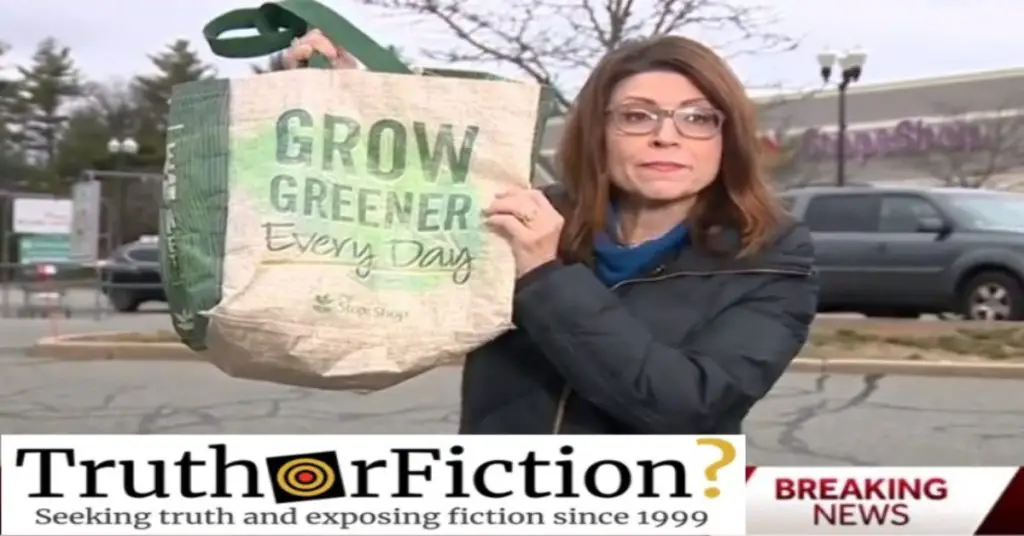Citing the spread of the COVID-19 pandemic, at least three states took steps to walk back bans on plastic shopping bags, while environmental advocacy groups accused the plastics industry of seizing on the virus for their own purposes.
In late March 2020, Massachusetts and New Hampshire suspended their state bans on the plastic bags, while a similar measure in Maine that was set to take effect on April 22 was suspended until January 2021. And in early April 2020, Oregon began allowing stores to provide disposable “tie-dye” style bags to customers at no extra charge.
While some news outlets reported that Illinois Gov. J.B. Pritzker enacted a similar ban, that was actually recommendation given to Pritzker by an outside group, the Illinois Retail Merchants Association, and was not an order.
According to WTTW-TV, the group also recommended that stores put more signs advising customers to maintain a distance of six feet between themselves and other shoppers, as well as adding online order and curbside pickup services to give shoppers more options, but noted that stopping the use of reusable bags in Chicago — where the use of paper or plastic shopping bags incurs a seven-cent tax — would be difficult to implement.
Meanwhile, Associated Press reported that among major retailers, Target and Trader Joe’s are allowing customers to shop with reusable bags provided that they bag their items themselves. But a Trader Joe’s spokesperson contacted us correcting that story, saying that in fact that retail chain had “have temporarily suspended the use of reusable bags at all of our stores.” Stores would provide paper bags for free use to shoppers instead.
However, another major city, San Francisco — one of the first large American cities to ban single-use shopping bags in 2007 — has reversed course. An update from the city’s Department of Public Health concerning its shelter-in-place ordinance directed businesses to stop “permitting customers to bring their own bags, mugs, or other reusable items from home.”
San Francisco County and five other Northern California counties have taken similar measures, as have at least two other cities: Bellingham, Washington and Albuquerque, New Mexico.
The Centers for Disease Control and Prevention has not issued a guidance on the use of reusable bags (often made of fabric or reusable plastic) as a possible carrier for the virus. A study led by the National Institutes of Health (NIH) found that COVID-19 droplets were detected on plastic and stainless steel surfaces up to 72 hours after initial contact. The team behind the study — which included researchers from both groups as well as Princeton University and the University of California, Los Angeles — summarized their findings in a letter published in the New England Journal of Medicine.
But as USA Today reported, pro-plastic lobbyists have argued to the government that single-use bags are a healthier alternative. According to a letter sent by the Plastics Industry Association to Health and Human Services Secretary Alex Azar on March 18 2020:
We are asking that the Department of Health and Human Services investigate this issue and make a public statement on the health and safety benefits seen in single-use plastics. We ask that the department speak out against bans on these products as a public safety risk and help stop the rush to ban these products by environmentalists and elected officials that puts consumers and workers at risk.
On March 26 2020, the environmental activist group Greenpeace pushed back in a statement of its own citing the letter published in the Journal of Medicine.
“For years, the plastics industry has pushed industry-funded research to try to discredit the movement to end single-use plastic pollution,” said a specialist for the group, Ivy Schlegel. “And when COVID-19 began to spread, they saw it as an opportunity to strike and activate their network of pro-plastic surrogates. Now more than ever, we need independent guidance from medical professionals to inform our decisions around hygiene and shopping. People’s safety should come before profits.”
Update April 13 2020, 7:37 a.m. PST: Updated with note from Trader Joe’s regarding their bag policy for shoppers.
- Plastic Bag Bans Reversed: States, Cities, Stores are Suddenly Banning Reusable Bags During Coronavirus
- Plastic Bag and Plastic Film Recycling
- Reusable Bags Aren't 'Banned' But Stores Are Wary of Them. Here's How to BYOB Safely
- Grocers Now Banned from Using Customers' Reusable Bags
- Gov. Baker Prohibits Reusable Shopping Bags During Coronavirus Emergency
- San Francisco Bans Use of Reusable Bags and Other Items Over Coronavirus Concerns
- Six Bay Area Counties Ban Use of Reusable Bags at Grocery Stores
- Bellingham Suspends Plastic Shopping Bag Ban Over Coronavirus Fears
- New Research Shows the Plastic Industry is Exploiting COVID-19 to Attack Reusable Bags
- Aerosol and Surface Stability of SARS-CoV-2 as Compared with SARS-CoV-1
- Study Suggests New Coronavirus May Remain On Surfaces For Days
- Pandemic deals blow to plastic bag bans, plastic reduction
- Coronavirus Pandemic Deals Blow to Plastic Bag Bans, Plastic Reduction

